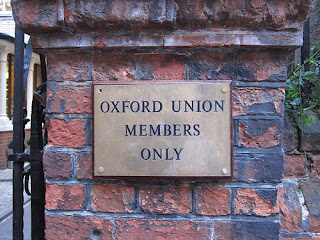
This 200-page history of the Oxford Union preserves undergraduate wit with enormously greater permanence than it is in undergraduate wit’s nature to be preserved. Try telling a college student that a joke he made yesterday — for example, “The honourable gentlemen have turned their backs on their country and now have the effrontery to say they have their country behind them” (p. 38) — will be recorded in a book and chuckled at by a casual reader more than a century later. The average student believes some pretty outlandish things about what he is going to accomplish in his four years (write the Great American Novel or prove the Riemann hypothesis, usually), but he’s not likely to believe that .
But the book has an entire appendix called “The Wit of the Oxford Union,” which is just five pages of vintage jokes. For example, from the subsection on the 1930s and ’40s:
The Liberal Party is like a lobster, by nature blue, except when it gets into hot water, when it turns red.
As for the Ten Commandments, even Solomon in all is glory was not troubled by some of these.In the 1970s and ’80s, the wit of the Oxford Union seems to have addressed itself exclusively to insults:
If the honorable gentleman did not have a moustache, he would be a barefaced liar.
The honorable opposer’s speech was very similar to Noah’s Ark; it drifted endlessly on the waters, found no solid ground, and was filled with all manner of strange things — with all of them in tedious duplicate.
I am told, Sir, that the City Council wanted to name a street after you, but they couldn’t find one narrow and twisting enough.
His suit always fits him like a glove; it sticks out in five places.And:
I would remind honorable gentlemen that the bar is open during the honorable opposer’s speech.You should feel free to use that one at the Rotary Club.
I picked up this book expecting to learn that student debating societies are the same wherever you go, and with a few exceptions that seems to be the lesson, at least comparing Oxford with the Yale Political Union (of which I am a former speaker; please, hold your applause). Both have had to confront the central problem of an undergraduate debating society, which is that everyone is ignorant and no one knows anything — which Yale dealt with by ignoring it and, if that became insupportable, not caring. Oxford did a bit of that, but they also employed the alternative tactic of saying to hell with it and debating resolutions like “The miniskirt does not go far enough.” They also debated poetry (“R, that late Tennyson is unworthy of him”) and history (“R, that Cromwell was a hero”), which subjects have nothing to do with the real world, meaning students are more competent to speak on them.
The presence of women is another dilemma both unions have shared (the YPU pondered this dilemma often ), though I find it interesting that the half-measure of permitting women to sit in the gallery was more problematic for the Oxford Union than allowing them to speak and hold Union office. When the women were unable to answer back, the men were apt to do things like what young Kenneth Tynan did: declare that, unlike the speaker opposite, he was against trying to have it both ways, “since I know for a fact that there are at least forty-seven different ways of having it, not excluding the one on the grand piano.” Benazir Bhutto (president in 1977) would have put him in his place, I bet.
The YPU never actually debated “Resolved: This House deserves its doubtful reputation,” but like the Oxford Union, we knew we had one. “Doubtful reputation” in this case refers to careerism and self-importance, alas, not anything dangerous or sexy — though I was amused by the description on p.111 of one young Oxford Communist as “a man who needed a nurse, while she, poor lady, would need a chaperone.”
You have a decision to make: double or nothing.
For this week only, a generous supporter has offered to fully match all new and increased donations to First Things up to $60,000.
In other words, your gift of $50 unlocks $100 for First Things, your gift of $100 unlocks $200, and so on, up to a total of $120,000. But if you don’t give, nothing.
So what will it be, dear reader: double, or nothing?
Make your year-end gift go twice as far for First Things by giving now.


